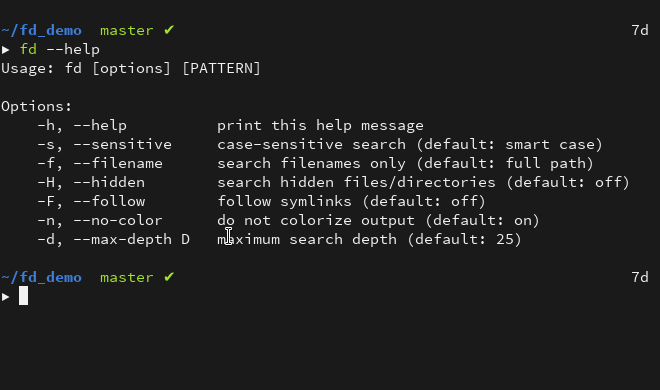|
|
||
|---|---|---|
| src | ||
| tests | ||
| .gitignore | ||
| .travis.yml | ||
| Cargo.lock | ||
| Cargo.toml | ||
| LICENSE | ||
| README.md | ||
README.md
fd
fd is a simple, fast and user-friendly alternative to find.
While it does not seek to mirror all of find's powerful functionality, it provides sensible (opinionated) defaults for 80% of the use cases.
Features
- Convenient syntax:
fd PATTERNinstead offind -iname '*PATTERN*'. - Smart case: the search is case-insensitive by default. It switches to case-sensitive if the pattern contains an uppercase character*.
- Colorized terminal output (similar to ls).
- Ignores hidden directories and files, by default.
- Ignores patterns from your
.gitignore, by default. - Regular expressions.
- Unicode-awareness.
- The command name is 50% shorter* than
find:-).
Demo
Colorized output
fd can colorize files by extension, just like ls. In order for this to work, the environment
variable LS_COLORS has to be set. Typically, the value
of this variable is set by the dircolors command which provides a convenient configuration format
to define colors for different file formats.
On most distributions, LS_COLORS should be set already. If you are looking for alternative, more
complete (and more colorful) variants, see
here or
here.
Benchmark
A search in my home folder with ~150.000 subdirectories and ~1M files. The given options for
fd are needed for a fair comparison (otherwise fd is even faster by a factor of 5 because it
does not have to search hidden and ignored paths):
benchmarking bench/fd --hidden --no-ignore --full-path '.*[0-9]\.jpg$' ~
time 2.800 s (2.722 s .. 2.895 s)
1.000 R² (1.000 R² .. 1.000 R²)
mean 2.821 s (2.810 s .. 2.831 s)
std dev 16.52 ms (0.0 s .. 17.02 ms)
variance introduced by outliers: 19% (moderately inflated)
benchmarking bench/find ~ -iregex '.*[0-9]\.jpg$'
time 5.593 s (5.412 s .. 5.798 s)
1.000 R² (0.999 R² .. 1.000 R²)
mean 5.542 s (5.502 s .. 5.567 s)
std dev 37.32 ms (0.0 s .. 42.77 ms)
variance introduced by outliers: 19% (moderately inflated)
(benchmarking tool: bench)
Both tools found the exact same 14030 files. Note that we have used the -iregex option for find
in order for both tools to perform a regular expression search. Both tools are comparably fast if
-iname '*[0-9].jpg' is used for find.
Install
With cargo, you can clone, build and install fd with a single command:
cargo install --git https://github.com/sharkdp/fd
Note that rust version 1.16.0 or later is required. The release page of this repository also includes precompiled binaries for Linux.
Development
cargo build --release
